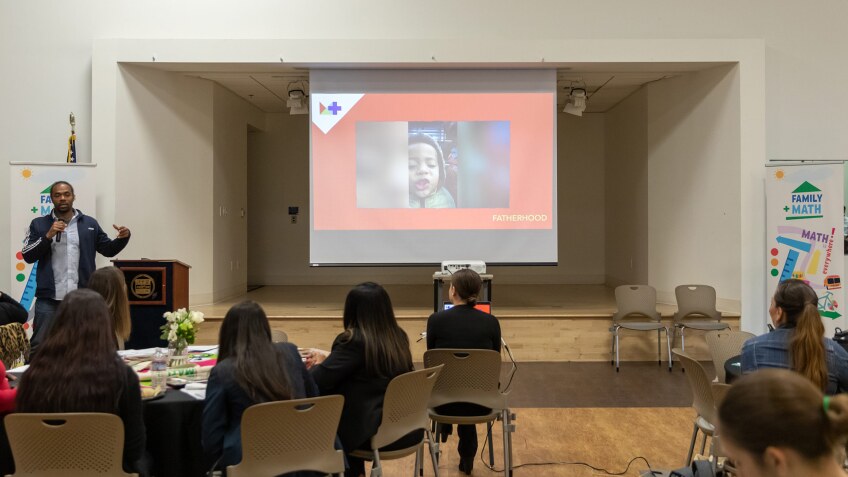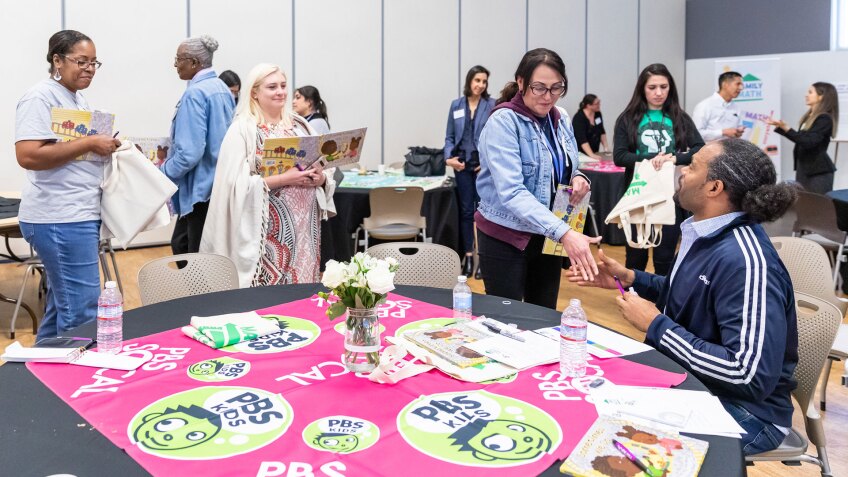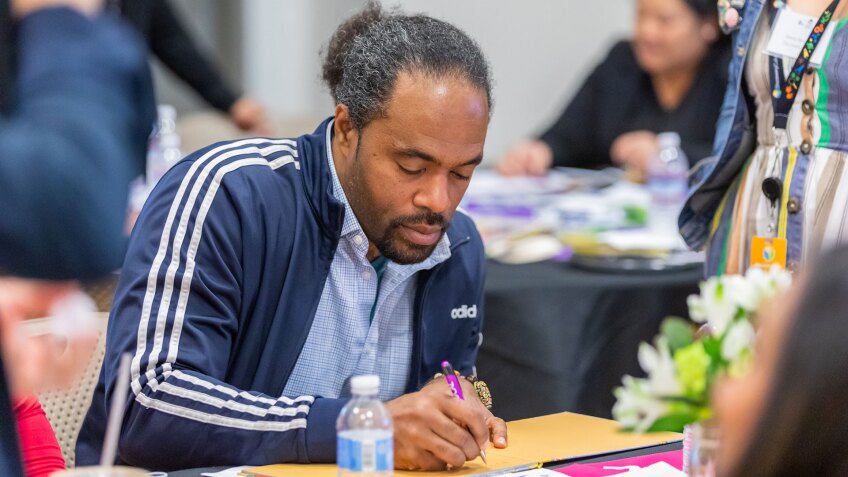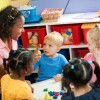Math is Everywhere: Organizer Omo Moses Activates Communities With Playful Learning
Jaws dropped as the crowd watched a 2-year-old describe the Boston rail system in great detail, building cube towers to represent the train network, and spelling out long train station names as he read them on a map. Omo Moses’ eyes filled with pride as he showed videos of Johari, his now-7-year-old son, dominating early math concepts while enjoying his love of trains. In his keynote speech at the PBS SoCal Family Math Convening on Feb. 27, Moses talked about the power of exposing children to playful math.

“How do we inspire adults and kids, particularly those in economically distressed communities, to enjoy math everywhere?” Moses asked, as an example of the questions that guide his work.
Moses, CEO of the early math education lab MathTalk, spoke to a crowd of about 60 educators and community leaders at the Douglas F. Dollarhide Community Center in Compton, California. PBS SoCal hosted the event as part of its commitment to bridge the various gaps in early learning education in our communities through educational tools and workshops for parents and teachers, as well as with partnerships and events in neighborhoods across the region. Stemming from this work, PBS SoCal has announced Family Math, an initiative supporting Compton parents and caregivers exploring math concepts with their children aged 2 to 5. Family Math is looking to create awareness that math is everywhere, including in our parks, grocery stores, laundromats and many other places outside of the classroom. Moses was invited to share his philosophy in achieving similar goals, as he uses math to help divert children from the systemic pitfalls present in their communities.
Viewing math as a tool to effect change, Moses views himself as an organizer creating math experiences with the community.
“Our job is to inspire people and expand what’s possible for these kids.” Omo Moses
“It’s a way of engaging people at a community level and moving toward a solution for a particular challenge,” Moses said. “It centers on thinking how you build relationships and how you engage in conversations to land on a shared interest.”
Moses co-designed MathTalk with residents of The Port, the Cambridge, Massachusetts neighborhood where he grew up. His first hire for the program was his childhood friend who also had deep roots in the community. He said building a team with local residents and recognizing their unique talents has helped him ground his work and gain community investment. Moses says building authentic relationships and showing genuine interest in a community’s needs has been essential in the program’s success.
“That has been my approach: How are we going to get people to move together on something?” Moses asked.

The program to “mathematize” and activate spaces in the neighborhood has engaged students, teachers, early childcare providers and residents to identify the community’s needs and generate ideas to tackle them. Using technology, community installations and workshops, MathTalk brings math into the everyday lives of parents/caregivers and children while they visit parks, shop at their neighborhood bodegas, or walk through the streets on their way to school. The program also includes an augmented reality app for young children to playfully explore math concepts with the aid of mobile devices.
“What would it look like to saturate the neighborhood with touch points and spaces where adults and kids can have positive math interactions?” Moses asked as he described the development of the program.
Moses draws inspiration from his childhood experiences with math and social issues often. He realizes that the grip of institutionalized oppression — and activism — has hit far too close to home for him to ignore. Growing up, he talked about how he remembered his father’s relentless math drills and what sounded like exaggerated warnings. “Your friends will all end up in jail if they don’t learn this math,” he remembered his father saying. Moses’ father was Robert Moses, a civil rights leader, a MacArthur “Genius” Fellow, and founder of the Algebra Project, a math literacy initiative for children of color.
“I know how strange it can sound to say that math literacy — and algebra in particular — is the key to the future of disenfranchised communities, but that’s what I think and believe with all of my heart.” Robert Moses
“I believe that the absence of math literacy in urban and rural communities throughout the country is an issue as urgent as the lack of registered voters in Mississippi was in 1961. I believe that solving the problem requires exactly the kind of community organizing that changed the South in the 1960s,” wrote Robert Moses in his 2001 book “Radical Equations: Civil Rights from Mississippi to the Algebra Project.”
The younger Moses began working with his father in the Algebra Project shortly after college. His work there led to him to launch the Young People’s Project, a program designed to train students as math literacy workers.
Now, as a father himself, Omo Moses appreciates the tremendous impact math had on his upbringing and practices a more playful version of his father’s math drills on his children Johari, 7, and Kamara, 5. In 2019 Moses wrote “Sometimes We Do,” an illustrated children’s book featuring his children and the math conversations they have while bonding and making pancakes on special mornings.

“Whether it's doing math through cooking or doing math through games, it helps adults reconnect with experiences that they might already be familiar with and that are culturally rich and relevant to them,” Moses said.
He wants to instill the belief in parents that they, too, can engage their children in math talks on an everyday basis. “I come to this work as a dad, not an expert,” he says, reminding parents of the power they have to push back and advocate for their children in traditional school systems failing to recognize and encourage their aptitudes — and also failing to recognize the culturally relevant knowledge the parents bring to the table. We must keep raising the floor and testing the limits of how much our children’s minds can grow at an early age, he said.
“Our job is to inspire people and expand what’s possible for these kids,” Moses said.
Looking forward, he said he is thinking about building support mechanisms for parents who need additional resources at every grade level, in every subject. This could take the shape of a family study group or a parent collective.
“We know kids are going to keep dropping off and parents are only going to be able to do so much, so what can the city commit to doing when they hit that wall?” he wondered aloud.
Moses is dedicating his life to showing young children and their parents that math is all around them and it’s part of what they already do, whether they’re riding trains or making pancakes.
“I know how strange it can sound to say that math literacy — and algebra in particular — is the key to the future of disenfranchised communities, but that’s what I think and believe with all of my heart.” wrote Robert Moses.
Three generations of the Moses legacy, and all the lives they’ve touched along the way, show that this vision is not so strange after all.

Learn more about MathTalk on the MathTalk website and about Family Math on the PBS SoCal website.

